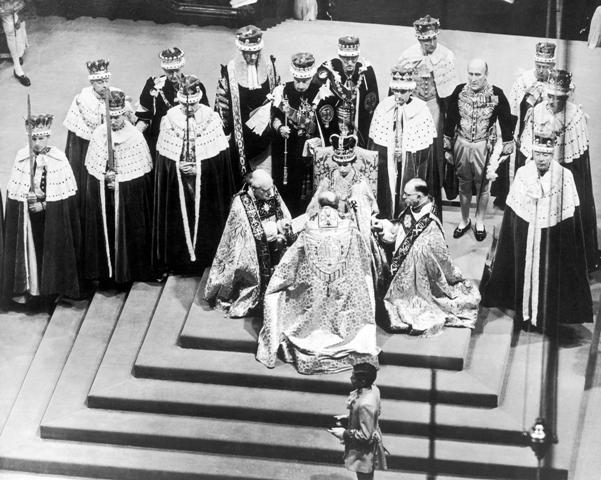 2 June 1953: The Coronation of Queen Elizabeth II. [Photo: Trinity Mirror / Mirrorpix / Alamy stock]
2 June 1953: The Coronation of Queen Elizabeth II. [Photo: Trinity Mirror / Mirrorpix / Alamy stock]
[In this article from September 1953 – the third in a series exploring the meaning of the coronation for the empire and Commonwealth – Dermot Morrah, an Arundel Herald, waxed lyrical about the coronation of Elizabeth II, which he found ‘perfect beyond all expectation and all praise’. He nevertheless returned to his previous theme, the need for the ceremony to reflect the reality that Elizabeth was now Queen of many Commonwealth realms, suggesting a ‘crown of the Commonwealth’. The full version of this article is free to access from the Round Table Journal archives until 23 May.]
By common consent the great solemnity of June 2 was unique in British history, arousing a depth of emotion not stirred in England at least since the coronation of Charles II, and not felt in the Commonwealth and the outer world atany time. This universal, intense and often devout interest is not to be wholly explained by the new devices which for the first time allowed the multitudes to watch the ceremony with their own eyes as it proceeded. The rite in which they were thus enabled almost to participate was in fact more worthy of the august tradition in which it was rooted than any rendering for centuries. Hanoverian coronations reflected the cynical disregard of the ruling grandees for the mystical values of the monarchy, and for a century the gross ostentation of the banquet overshadowed the sanctities of the royal dedication before the altar. Extreme secularism, still in the ascendant when Queen Victoria was crowned, was reinforced by the parsimony of the reaction against the extravagance of the coronation of George IV, the last at which the ancient inaugural ceremonies in Westminster Hall were included. The coronation of Edward VII, already handicapped by the difficulties of recovering an almost lost tradition after the long reign of his mother, was marred at the last moment by the sudden illness of the King, and the consequent necessity both to postpone and to curtail the ceremony. That of George V was celebrated by a nation bitterly divided by the party quarrel over the House of Lords, with a further dispute over Ireland on the horizon; and when George VI came to Westminster the heart-searchings over the abdication of his predecessor had scarcely been allayed.
The Commonwealth and the Coronation – 1951
The Coronation and the Commonwealth II – A plea resumed, 1952
The Coronation and the Commonwealth IV – Some oversea opinions, 1953
By the time of the accession of Elizabeth II, however, all such disturbing factors had ceased to operate. A nation and Commonwealth that had lately confronted and survived great dangers under the leadership of the historic Crown were profoundly conscious of their unity at a deep level on which the necessary divisions of party, much milder now than in former reigns, were not relevant. A princess long known and loved, whom the entire Common-wealth had confidently accepted as the symbol of its future hopes, had all the world on her side when she came to take seisin of her dominion. Her known dedication, her youth, her grace and charm, which in the supreme sacra-mental moment were visibly transfigured to spiritual beauty, uplifted the hearts of all. In the dark and stormy aftermath of world war, through which the Commonwealth still painfully struggles, there was a renewed vision of light ahead.
Moreover, the actual performance of the great solemnity, considered even technically as if it were a dramatic production, was perfect beyond all expectation and all praise. “The beauty of holiness” could not have been more exquisitely typified and displayed. The scholars who worked on the revision of the liturgy itself had matched learning with aesthetic sense. The Archbishop of Canterbury, the Dean of Westminster, and the Earl Marshal, chiefs of the great company of men who had prepared the ceremonies over many months and executed them faultlessly on the day, are entitled to feel that through their labours a sublime spiritual experience was communicated to many nations.
Free-to-access articles from the Round Table Journal are updated regularly. Updates can be found on the front page of the Round Table website
The 1952 Accession vows and naming a ‘Head of Commonwealth’
Having said all this, it may seem ungenerous to resume a suspended debate and say that there is very much about the conduct of the ceremonies which needs to be seriously considered, with a view to substantial change before the time — far distant, as all pray — when another coronation has to be pre-pared. Yet none of the arguments which were advanced in previous issues of The Round Table for associating the oversea members of the Common-wealth more closely and visibly with the Sovereign’s consecration have lost their force. Specific proposals, intended to relate the symbolic rites more closely to the contemporary world without doing violence to the ancient tradition, were then put forward. They were favourably regarded by the press of many parts of the Commonwealth, and many private expressions of approval reached the Editor of the Round Table. It was, however, represented to him — such are the administrative complexity of modern life and the multitude of authorities who have to be consulted in a matter affecting the whole Commonwealth — that even nine months before the coronation, when the proposals were first published, it was already too late to make any significant change in the arrangements. The time to propose amendments of the ceremonies, as one of the most responsible functionaries observed to the Editor, is not just before but just after a coronation.
The free-to-access programme from the Round Table Journal and Taylor & Francis is curated by Alex May and Paul Flather. Updates can be found on the Round Table website front page.



